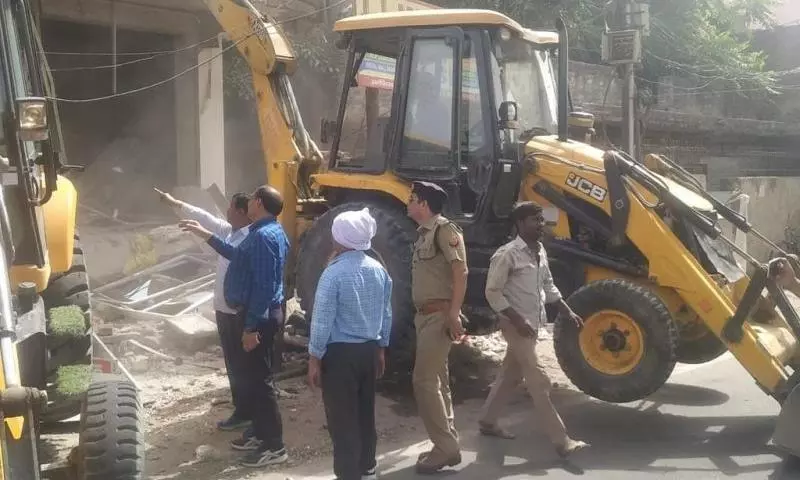
SC's bulldozer verdict | Judiciary can be ultimate guardian of democracy
Judgment asserts arbitrary punishment can't be given to a collective for an individual’s alleged crime — including the accused's family or neighbours

The landmark judgment on November 13 by the Supreme Court Bench of Justices BR Gavai and KV Viswanathan against the growing phenomenon of state illegality in carrying out “bulldozer justice” came as immense relief to those concerned about the erosion of the rule of law in India.
It reassured citizens that the judiciary can act as the ultimate guardian of democracy, defending the Constitution and the rule of law.
“No demolition without due process of law” — with this decisive statement, the Supreme Court firmly opposed retributive justice tactics by the executive, such as using bulldozers to demolish the homes of individuals accused of wrongdoing.
Also read | Bulldozer justice unknown to any civilised system of jurisprudence: SC
No transgression of the rule of law
While delivering the judgment, the court reaffirmed Constitutional rights protecting individuals from arbitrary state action. It clarified that legal processes should not prejudge an accused person’s guilt.
The court emphasised on the separation of powers, stressing that the executive cannot assume the role of a judge and that the judiciary serves as the ultimate arbiter.
Quoting jurist AV Dicey on the principle of the rule of law, the court noted that under India’s constitutional framework, there is no room for arbitrariness by officials, and no one can be punished without a court’s establishment of their violation of the law.
Umbrella concept
In the judgement, the apex court went on to make an astonishing observation: “The rule of law is an umbrella concept to protect the citizens against the power of the state.” The next several pages of the judgement can be read as an excellent treatise on the rule of law.
Also watch: 'Bulldozer ruling a slap on the face of the Executive': SC lawyer Anas Tanwir
The Supreme Court issued pan-India guidelines for demolitions, stipulating that they be conducted with due process rather than as punitive actions. Before any demolition, a show-cause notice must be issued, and 15 days must be given for those affected to appeal. The demolition must be videographed, the court directed.
The judgment also reiterated that even criminals have the right to dignity and must not be subjected to cruel or inhuman treatment.
Right to Residence as part of Right to Life
The court reaffirmed that the right to residence, linked to the right to property, is part of the fundamental right to life.
Right to Property was a fundamental right under Article 31 of the Constitution until 1978, Professor Babu Mathew from the National Law School University, Bangalore, explained to The Federal.
“The Janata government brought in the 44th constitutional amendment in 1978 to change it to a constitutional right under Article 300 (A). However, Article 300 (A) still reaffirms that ‘no person shall be deprived of his/her property except by due process of law’,” he added.
Mathew also noted that under Article 300(A), compensation for land acquisition, should be based on market rates.
No collective punishment for individual crimes
The judgment also asserted that arbitrary punishment cannot be given to a collective due to an individual’s crime, noting that other family members or even unrelated families may live in the same house.
Also Read: No more ‘bulldozer justice’: SC slams executive, lays down pan-India rules
“Entire Muslim bastis were demolished during the CAA protests in states such as Jharkhand and Madhya Pradesh. Even Delhi Police, which is under the Union Home Ministry, did it when a few Muslim youths pelted the police with stones during demonstrations,” Chennai-based lawyer S Kumaraswamy told The Federal, likening it to colonial-era retribution practices.
“There is no place for it in a constitutional republic. No one can be deprived of their right to residence without due process, as it is part of the Right to Life,” he said.
To deter officials who may bypass the law, the court issued a warning: “If the demolition is found to be in violation of the orders of this Court, the officer/officers concerned will be held responsible for restitution of the demolished property at his/their personal cost in addition to payment of damages.”
Henceforth, if any executive magistrate violates the law with impunity and unleashes the bulldozer on any alleged offender’s house, he/she may have to pay through the nose. That is the most effective operative part of the judgment.
Political implications
Of course, the Supreme Court confined itself to the legalities of the case and made no mention of its political dimensions. Yet, the judgement has come as a slap on the face of BJP leaders.
Also read | Home is where the heart breaks: The tragic cost of ‘bulldozer justice’
After all, it was the BJP’s Uttar Pradesh Chief Minister Yogi Adityanath who pioneered bulldozer politics in the state as a general policy of retributive justice, first against criminals and mafia elements, and later against minority activists. Subsequently, Yogi’s ‘Bulldozer Model’ was picked up by other BJP-ruled states such as Madhya Pradesh and Haryana, and by Delhi Police under the Union Home Ministry.
Abdul Rahman, Tamil Nadu President of the Welfare Party of India, welcomed the judgment but regretted its delay. “Had the higher judiciary taken suo-motu cognizance of such demolitions during the 2019 CAA protest in UP, many of them could have been averted,” he said, expressing concern that the ruling dispensation might try to circumvent the judgement in some way.
As Babu Mathew pointed out, “bulldozer politics” marked a low point in India’s rule of law, driven primarily by majoritarianism. “It’s reassuring that the Supreme Court upheld the principles that, one, no one can be condemned unheard, and two, no one can be a judge in their own cause,” he added.

